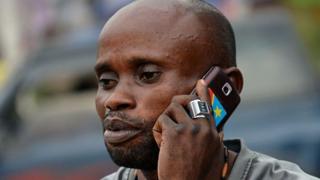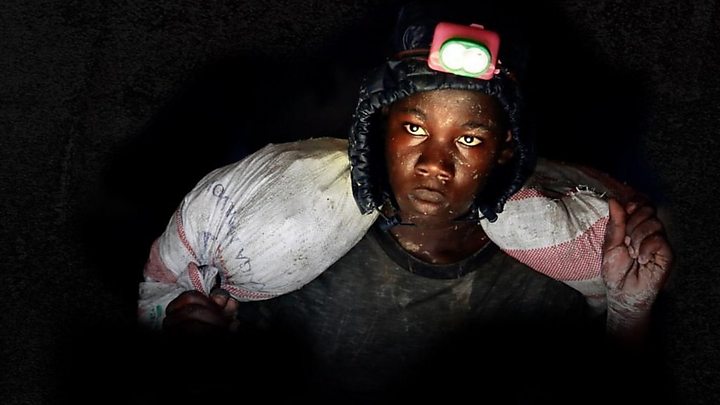DR Congo poll: Five things to know about the nation that powers mobile phones - BBC News
 Image copyright
Getty Images
Image copyright
Getty Images
The Democratic Republic of Congo - the world's leading producer of cobalt, used to power mobile phones and electric cars - holds landmark elections in most of the country on Sunday.
Three frontrunners have emerged in the race to succeed President Joseph Kabila.
Here are five things to know about the country that through its mineral resources plays a vital role in the world economy:
1) There has never been a peaceful transfer of power
Since independence in 1960 violence has always accompanied the transfer of power from one leader to another.
Joseph Kasavubu became president following the 1960 election, held a month before independence, and Patrice Lumumba became the prime minister.
But Lumumba was later sacked after a power struggle. In 1961, interference by former colonial power Belgium led to him being handed over to rebels who executed him, cut up his body and dissolved it in acid.
The power behind the throne in the early years was army chief Mobutu Sese Seko, who became president following a coup in 1965.
Image copyright Getty Images Image caption Mobutu Sese Seko was overthrown in 1997 after 32 years in powerAfter 32 years in power he was ousted by rebels supported by neighbouring countries.
His successor, rebel-leader Laurent Kabila, was assassinated by his bodyguard in 2001. His son, Joseph Kabila, replaced him at the age of 29, making him the world's youngest leader at the time.
Two years after he was supposed to leave power, Mr Kabila is standing down. Many Congolese hope that Sunday's vote will see a peaceful transfer of power to his successor.
2) A land of riches
The country is central to the boom in electric car sales.
Among a wealth of other metals, DR Congo is thought to have more than half of the world's supply of cobalt - an essential ingredient in the batteries that power electric vehicles and mobile phones.
In theory, the reserves of cobalt and other minerals like diamonds, copper and gold, should make DR Congo one of the richest countries in Africa, but its people are among the poorest.
DR Congo has been exploited for its wealth since the first European explorers arrived in the 15th Century.

Media playback is unsupported on your device
Media caption DR Congo: The crime behind the chaosIn the 19th Century, King Leopold II of Belgium ran the country as his own personal colony, forcing people to collect wild rubber for tyres, feeding Europe's hunger for bicycles and, in the next century, cars.
Later, copper became a major export for the colonisers.
In the post-independence era, Mobutu got rich as the country became poor. Today corruption and mismanagement prevents the wealth being used to lift people out of poverty.
3) It is a very big place
DR Congo is about the size of mainland western Europe.
Its poor infrastructure makes it very difficult to get around and presents logistical challenges to organising the election.
The country's only super-highway is the Congo River, and there are no major roads linking the west to the east.
The government has not taken up the offer of logistical help from the United Nations, which has had a peacekeeping force in the country for nearly 20 years.
It has been a big challenge to make sure everything is delivered to the 75,000 polling stations in time - and the election commission had to delay the poll by a week
4) Battery-powered voting?
Large parts of DR Congo are without running water or regular power, and that is a concern when ballots are cast using electronic voting machines.
Though electronic voting has been used elsewhere, this is the first time this exact machine will be tried, raising worries that it is untested in an election scenario.
Image copyright Getty Images Image caption The e-voting machine are controversialEach voter will enter the polling booth to make a choice by selecting candidates on a tablet-like device.
This choice will then be printed on a ballot paper, and submitted by the voter. It is these paper ballots that will then be counted. The machines will also keep an electronic tally to help verify the results.
Opposition parties have questioned whether they will deliver a free and fair election.
There are also concerns that given the challenges of the poor infrastructure and the short time the machines have been in the country the system may not be robust enough.
As if to underline the problems, weeks before the vote, a fire gutted one of the main electoral commission warehouses, destroying ballot papers and more than two-thirds of the voting machines allocated for the capital, Kinshasa.
This led the vote to be delayed for a week.
5) War and Ebola destabilising the east
The eastern area of DR Congo has been worst-affected by war over the past two decades.
Scores of militant groups operate across the country but the biggest security challenge at the moment is Beni in North Kivu.
It not only has the dangerous Ugandan Islamist militia group, the Allied Democratic Forces (ADF), launching attacks on civilians, government forces and the UN, but it is also an active Ebola zone.
The electoral commission blamed the insecurity and the Ebola outbreak for the postponement of the vote in two areas of the east.
The outbreak of Ebola was confirmed earlier this year and nearly 500 people have been infected so far.
The combination of instability and a lack of faith in UN aid workers - because ADF attacks are going on despite the presence of peacekeepers - means the outbreak is particularly hard to tackle.
It is the second largest outbreak since the virus was first discovered in 1976 in DR Congo, then known as Zaire.
The largest killed more than 11,000 in West Africa between 2013 and 2016 - mostly in Liberia, Guinea and Sierra Leone.